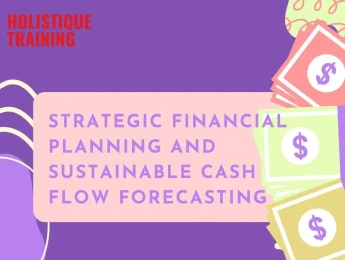This comprehensive course will equip you with essential skills in project planning, financial management, and cost oversight. Through a blend of theory and practical exercises, participants will learn to navigate the intricacies of project scheduling, budgeting, and cost control, ensuring the successful execution of projects within defined parameters. Understanding the nuances of costs is paramount for creating feasible plans that integrate financial and non-financial resources into organisational strategies.
Upon completion of this course, participants will be able to:
- Grasp the fundamental aspects of costing and budgeting, distinguishing between fixed and variable costs, direct and indirect expenses, and operational and capital expenditures.
- Develop and implement effective work breakdown structures for project management.
- Formulate realistic, measurable project objectives aligned with stakeholder requirements to drive positive outcomes.
- Utilise proven techniques to estimate project duration and costs while integrating innovative approaches to achieve cost savings.
- Enhance capital budgeting skills and understand its implications.
- Implement methods for measuring, managing, and monitoring project performance effectively.
- Conduct risk assessments systematically to mitigate project uncertainties.
This course is ideal for professionals with direct or indirect budget responsibilities within their teams, departments, or divisions. It is particularly beneficial for:
- Professionals with direct or indirect budget responsibilities within their teams, departments, or divisions.
- Individuals on fast-track development programs seeking to enhance their financial management skills.
- Professionals from diverse business disciplines and departments involved in budget planning, cost analysis, and strategic decision-making.
- Employees across industries, including manufacturing, production, engineering, sales, and project management roles, seeking to improve their project planning and financial oversight abilities.
This course employs a multifaceted training methodology combining theoretical instruction with practical application. Participants will engage in interactive lectures, hands-on workshops, and group activities to reinforce key concepts. Using real-world case studies and financial scenarios will help participants connect theory to practice, enhancing their ability to plan, budget, and oversee project costs effectively. Role-playing exercises and simulation games will provide experiential learning opportunities, allowing participants to apply risk management techniques and project control strategies in a controlled environment. Continuous feedback and reflection sessions will facilitate personal and professional growth, ensuring participants can transfer their newfound skills to their respective roles.
Day 5 of each course is reserved for a Q&A session, which may occur off-site. For 10-day courses, this also applies to day 10
Section 1: Financial Foundations for Project Management
- Understanding the pivotal role of management accounting in project planning.
- Exploring the interconnection between strategy implementation and budget formulation.
- Delving into the concept of accountability in project finances.
- Comprehensive overview of budget formation, fixed and variable costs, and Cost-Volume-Profit analysis.
- Mastering cost allocations and performance measurement techniques.
- Introduction to capital budgeting and Activity-Based costing.
- Developing balanced scorecards to assess project performance.
- Initiating projects and defining project charters.
Section 2: Project Initiation and Planning
- Identifying key stakeholders and their roles in project execution.
- Analysing project costs and conducting financial feasibility assessments.
- Understanding interest rates, cash flows, and financial analysis for projects.
- Defining project scope and establishing Work Breakdown Structures (WBS).
- Utilising network planning techniques to identify critical paths.
- Setting and celebrating project milestones.
- Implementing time-saving strategies for efficient project management.
Section 3: Risk Management and Project Control
- Fundamentals of Risk Management: types, tolerances, and planning.
- Identifying and assessing project risks systematically.
- Quantifying and developing strategies to mitigate project risks.
- Managing project teams effectively to ensure project success.
- Introduction to Earned Value Management (EVM) principles.
- Establishing project tracking mechanisms and control objectives.
- Implementing integrated change control processes.
- Ensuring quality assurance and quality control throughout the project lifecycle.
- Managing communication channels and documentation effectively.
- Introduction to Linear Scheduling Management (LSM) and Lean Project Management principles.
- Closing projects and conducting post-project evaluations.
Upon successful completion of this training course, delegates will be awarded a Holistique Training Certificate of Completion. For those who attend and complete the online training course, a Holistique Training e-Certificate will be provided.
Holistique Training Certificates are accredited by the British Assessment Council (BAC) and The CPD Certification Service (CPD), and are certified under ISO 9001, ISO 21001, and ISO 29993 standards.
CPD credits for this course are granted by our Certificates and will be reflected on the Holistique Training Certificate of Completion. In accordance with the standards of The CPD Certification Service, one CPD credit is awarded per hour of course attendance. A maximum of 50 CPD credits can be claimed for any single course we currently offer.
- Course Code PO4-112
- Course Format Classroom, Online,
- Duration 5 days














